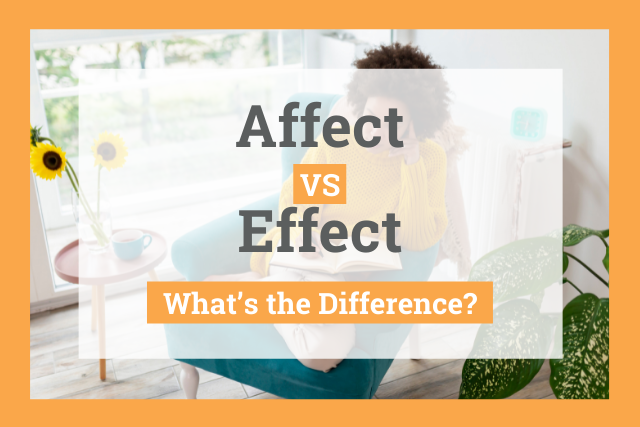
The English language loves its homophones, or words that sound the same.
Affect and effect are two words that are easy to mix up. They cause a lot of confusion because, not only do they sound alike, they also have similar meanings.
Even native English speakers (and some professional writers!) have difficulty knowing whether to use affect or effect in a sentence. So which is the right word?
The short answer is that affect is normally used as a verb meaning “to impact in some way,” and effect is normally used as a noun meaning “the result of a cause.”
However, there are a few exceptions to this rule.
This article will help you understand the basic difference between affect vs effect and learn how to use these two words correctly in your writing.
What’s the Difference Between Affect and Effect?
When you’re deciding whether to use affect vs effect, you must ask yourself: what is the role of the word in the sentence?
You will most likely use affect as a verb, or an action word, and effect as a noun, or an object word. Let’s look at a few example sentences.
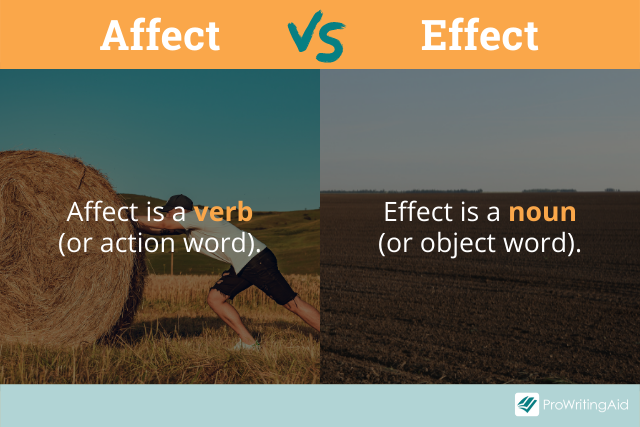
- What was the ___ of the vaccine on the virus?
The article “the” gives us a clue that we need a noun. The correct word is effect.
- The pandemic ___ the world in many ways, from social, to political, to economic.
In this case, we are looking for something the pandemic did to the world. It is an action, so we need a verb. The correct word choice here is affected.
One trick for remembering the difference between the two words is this helpful mnemonic: “Affect is an Action. Effect is an End Result.” Therefore, affect is usually the verb and effect is usually the noun.
When and How to Use Affect Correctly
There are several different ways the verb affect can be used. Let’s look at some examples of each.
1) To act on or cause a change in something or someone
Example: The cold weather affected our travel plans.
2) To cause illness, or symptoms, in something or someone
Example: COVID-19 has affected millions of people around the globe.
3) To produce an emotional response
Example: The music deeply affected him.
4) To influence someone or something
Example: When she broke off the engagement, he tried not to let his emotions affect his decisions.
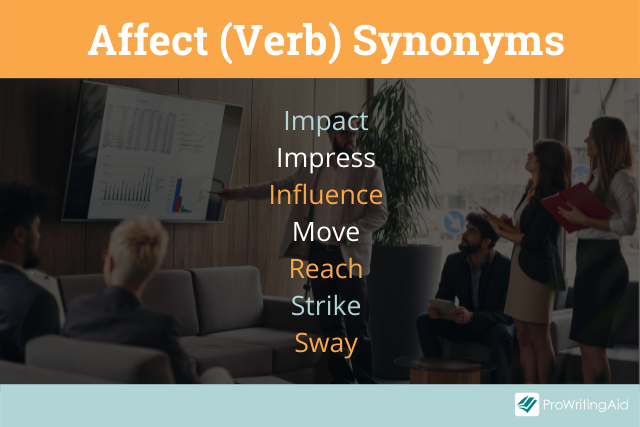
There are a few exceptions where affect is used as a noun, but those cases are rare.
We’ll cover the exceptions to the general rule in more detail later in the article.
When and How to Use Effect Correctly
As we mentioned earlier, effect is most often used as a noun.
The noun form of effect has multiple different meanings. We typically think of an effect as the result of a cause.
1) A thing that inevitably follows a cause
Example: Her singing had the effect of bringing the audience to tears.
2) A distinct impression
Example: The blue walls gave the effect of being cool.
3) Creation of a desired impression
Example: Alicia’s tears were purely for effect.
4) Something designed to create an impression
Example: The 3D effect made it feel as though you were on deck in a storm.
5) The state of being in operation
Example: The new rules for health and safety go into effect on June 1.
6) A power to bring about a result
Example: One positive effect of social media is that it gives a voice to the masses.
7) An outward sign
Example: The building’s modern facade gave the effect of a new construction even though it was 70 years old.
8) Intent
Example: The effect of the maestro’s sleight-of-hand was to dazzle the audience.
9) (Plural form) Someone’s possessions or belongings
Example: Please keep an eye on your personal effects to prevent thievery.
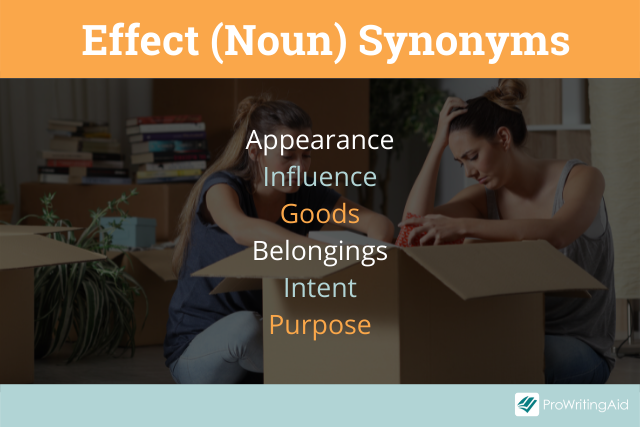
You can see that when effect is a noun it has multiple uses in modern speech.
If all of those meanings aren’t confusing enough, effect can occasionally be used as a verb.
Exceptions to the Rule with Affect and Effect
It’s English, so you know there are exceptions to the rule!
Every now and then, you might need to use affect as a noun or effect as a verb. These aren’t common uses, but you should know them anyway.
Affect as a Noun
Affect is mainly used as a noun in psychology.
Here, the noun affect refers to an individual’s overall demeanor. This includes facial expressions, body language, gestures, vocal tone, and other indications of how a person presents themselves.
You might see some writers use affect instead of the word disposition.
Here are some examples:
- All the girls displayed a positive affect after the extended vacation announcement.
- She had the affect of a teenager even though she was well into mid-life.
- After hours of interview and interrogation, the suspect’s affect changed from confrontational to friendly.
- Her flat affect in the courtroom made her appear unmoved by the crimes she'd committed.
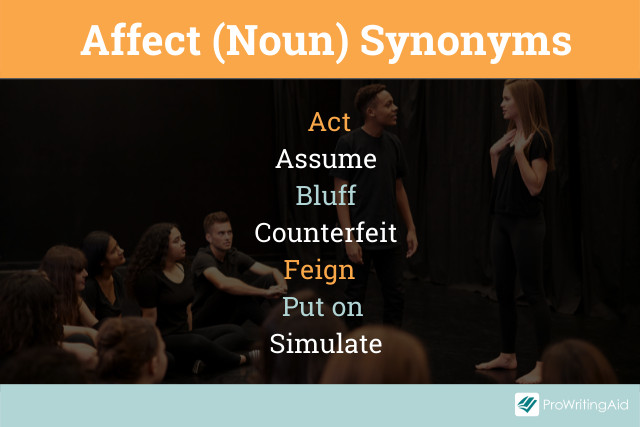
In older literature, affect can also mean sensation or passion, but this usage is obsolete in modern English.
Effect as a Verb
When effect is used as a verb, it means to make something happen.
This definition is commonly used in the political sphere where you might hear the phrases “effect a change” or “effect a new policy.”
Synonyms for effect as a verb include “bring about,” “cause,” and “engender.”
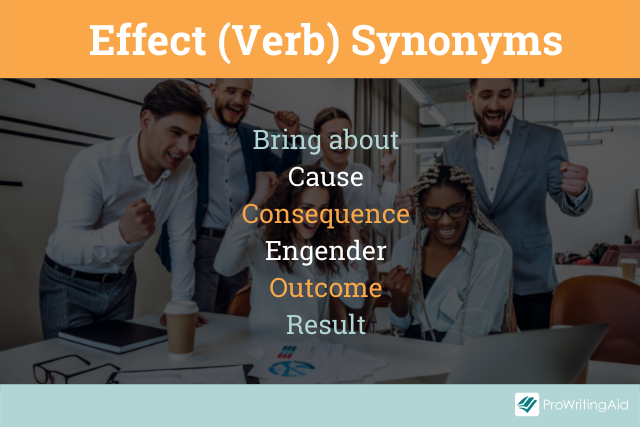
Here are some examples of effect as a verb:
- Although many cattle owners tried for years, they could not effect a change in the breed standard.
- The prisoner effected his escape with knotted bed sheets and towels.
- Human Resources effected a change in the hiring policy in mid-May.
- We need to effect new policies to help bring justice to our society.
Examples of Affect vs Effect in Sentences
The best way to learn any sort of grammar and spelling rule is through examples, so let’s look at some sample sentences.
- He said something to that effect.
- The law went into effect on September 1, 2020.
- My senior English teacher had a huge effect on my writing.
- The hashtags you use affect the performance of your social media posts.
- Did you know that petting a dog or cat can positively affect your serotonin levels?
- Bullying can affect people of all ages.
How About Affects vs Effects?
Here are some examples of the plural form of the noun effect versus the conjugated form of the verb affect:
- The effects of climate change are devastating.
- The soldier gathered his effects and left his station.
- She threw her boyfriend’s effects out the window after he betrayed her.
- Climate change affects polar bears and other Arctic animals.
- Every book Laura reads affects her emotions for days afterward.
- The rising temperature in the Pacific Ocean affects the development of baby turtles.
Affecting vs Effecting Examples
Now let’s look at some examples of the plural form of effecting versus affecting:
- Although the company brought in IT consultants, they had problems effecting change in how employees use the software.
- All instructors will be effecting these changes on Monday to keep better attendance records.
- The mayor will not be effecting the parking laws next week because the city council stalled the vote.
- The new on-campus structures are affecting student behavior off-campus, causing local disapproval.
- The new corporate guidelines are affecting how employees respond to bullying.
- The disregard of vaccination precautions is needlessly affecting children with measles.
Conclusion on Affect vs Effect
The words effect and affect are both about doing, but doing in different ways.
- Effect as a noun is the essence of the change.
- Affect as a verb is about making a change.
- Effect as a verb is bringing something about.
- Affect as a noun is someone’s emotional appearance.
ProWritingAid has tools that can help you with similar words like affect and effect.
Our Realtime Report can tell when you’ve used the wrong word.
It’s always a good idea to run this report in case you’ve mixed up the words effect and affect. It can catch many other misused homophones, too.
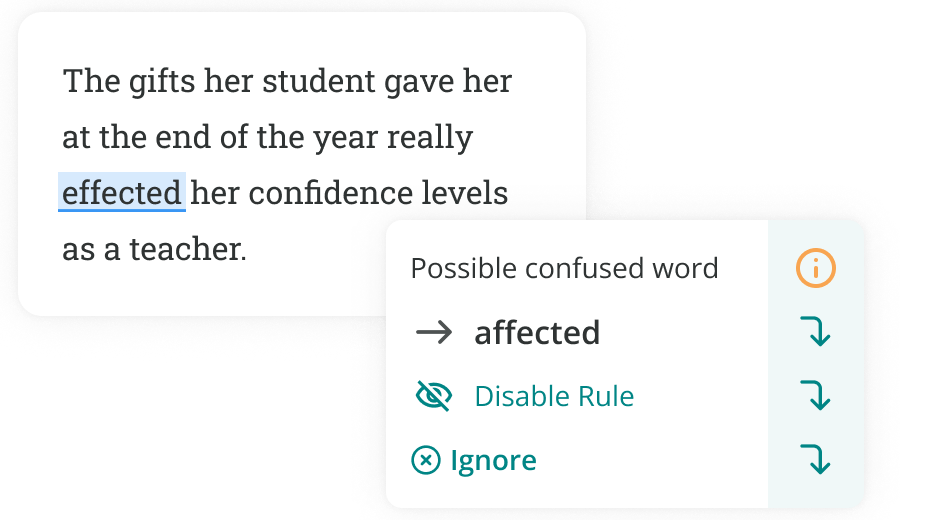
If you’re not sure why the software is suggesting a change, you can click on the orange “i” icon to refresh your memory on the difference between affect and effect.


